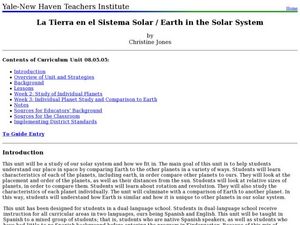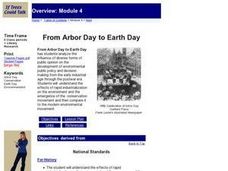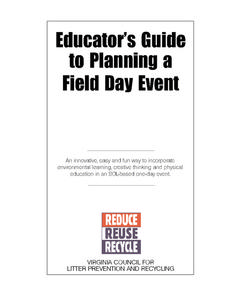Scholastic
Lesson One: The Earth, Background and Glossary
How much do you really know about our planet? Middle schoolers build up their prior knowledge about Earth, its placement in the solar system, its composition, and important geological vocabulary with an introductory earth science lesson.
Curated OER
Earth: Our Big Blue Marble
Students investigate Earth and its resources. For this Earth, space, and nature lesson plan, students collaborate to design presentations on the Earth, its cycles, and how humans have impacted the planet. Images, diagrams, and background...
Curated OER
What's Below the Earth's Surface?
Students identify the geological layers of the Earth. They graphically depict each layer's characteristics. Students label and develop a color key for their exhibit. They create a down-to-Earth 3-D display with Erasable Markers.
Curated OER
Earth in the Solar System
A three-week unit designed to be completed in an elementary level, dual-language immersion classroom, this resource includes several lessons intended to introduce young learners to the solar system, the Earth and how the Earth compares...
World Wildlife Fund
Land of the Midnight Sun
From days of 24 hour sunlight, to endless nights that last for days, the Arctic is a very unique place to live. Examine the seasonal changes that occur in the northern-most reaches of the globe and the impact they have on the plants and...
Curated OER
Extraterrestrials Visit Earth
Students compare the unique characteristics of Earth to other planets and then write descriptions of Earth that might attract fictional extraterrestrials to visit the planet. They design an appealing travel brochure that incorporates the...
Baylor College
Modeling Earth's Atmosphere
Life on Earth is made possible by the unique composition of its atmosphere. Working collaboratively, a scale model is created as young scientists learn about the different layers of gas that surround the planet. Cards are included that...
Redefining Progress
Have and Have-Not
Is there a correlation between a country's wealth and the extent of its ecological footprint? What exactly constitutes an ecological footprint, and how does one country stack up against the rest? This is a unique lesson to incorporate...
Curated OER
Powers of Persuasion
Did you know that clothing and textiles can be recycled, just like glass, paper, aluminum, and plastic? Pupils are introduced to textile recycling and design persuasive posters or letters that raise awareness about this unique...
Curated OER
Microbial Influence on Earth's Systems
Learners identify the different biogeochemical cycles on Earth. In this biology lesson, students observe microbes under a microscope. They compare and contrast respiration and photosynthesis.
Baylor College
Pre-Assessment: Earth's Energy Sources
A ten-question, multiple-choice quiz assesses what your elementary earth scientists know about the atmosphere both before and after a unique unit on global atmospheric change. Make sure to check out the activities and lesson plans...
Curated OER
Unique Plants of the Biomes
Students examine how the earth is divided into different biomes that are characterized by a distinctive climate. In this earth's surface lesson students identify adaptations of plants in specific biomes.
Curated OER
From Arbor Day to Earth Day
Students discuss their answers to a given set of questions regarding Earth Day and Arbor Day. They research using the internet then write a bigraphical sketch of their character.
Curated OER
The Earth's Layers: Day 6: Landforms II
Students closely examine the earth's crust and various landforms. In this Earth's layers lesson plan students work in cooperative groups and analyze their roles and responsibilities therein. Each group is assigned a specific landform to...
Curated OER
It's a Gas! Or is it?
Examine the effects of temperature and pressure on solubility and the states of matter of ocean water. Learners make inferences about the unique chemistry of ocean water at different depths. They engage in an activity related to...
Messenger Education
Star Power! Discovering the Power of Sunlight
It takes less than 10 minutes for energy from the sun to travel 90 million miles to Earth! In the first installment in a series of four, groups measure the amount of solar radiation that reaches Earth. They then discuss how this is...
NOAA
Into the Deep
Take young scientists into the depths of the world's ocean with the second lesson of this three-part earth science series. After first drawing pictures representing how they imagine the bottom of the ocean to appear, students...
Curated OER
Minerals of the Earth
Students learn and practice identifying Earth's minerals and their properties. Working in small groups, they evaluate minerals. This is a well-described lesson, which students enjoy.
Curated OER
The Earth's Surface
Students identify the characteristics of places. In this communities lesson, students discuss what they observe when they travel and construct a list of places in their neighborhood. Students use a Landscape Picture Map to circle...
Curated OER
The Water Cycle: States of Water
Elementary schoolers explore states of matter by concentrating on the ways in which water moves between its solid, liquid, and gaseous states in a variety of Earth environments. Learners interpret these movements through dance. The...
University of Colorado
Punnett Squares with Piebald Deer
Explore the science behind Earth's amazing diversity of life with this lesson on genetics. Looking at specific traits in piebald deer, carnations, and roan cattle, young scientists use Punnett...
Curated OER
Sandscapes to Landscapes
Students explore landscapes and create their own in a creative project.
Virginia Department of Education
Educator’s Guide to Planning a Field Day Event
Plan an environmentally friendly field day for your young conservationists with this collection of activities and resources. Whether it's bowling with plastic bags full of crumpled up newspaper and empty plastic...
Curated OER
Where in the World Is All the Water?
Middle schoolers investigate the distribution of the earth's water. They conduct a demonstration of water distribution, and create a pie graph to display the results.























